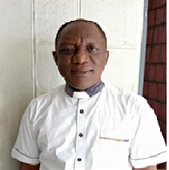Dr. Edwin Anaegboka Udoye, Nigeria

Rev. Fr. Dr. Edwin Anaegboka Udoye Nigeria is the Executive Director Justice, Development and Peace/Caritas Archdiocese of Onitsha. He did his post-graduate studies in Julius Maximillian University Wuerzburg, Germany in Pastoral Theology and Religious Education. He has been involved social and development work for more than eight years. He has piloted affairs on promoting Environmental Justice/Cleanliness and Good Governance by being giving voice to the poor, the marginalized and the vulnerable through good governance projects. Equally, he has been involved in promoting wellbeing of orphans and vulnerable children and financial empowerment programs for rural and riverine peasant farmers. Through social and economic justice initiatives, he built the capacity of traders and farmers on investment economy, business sustainability and saving culture. He has attended seminars on project management, organizational capacity strengthening, leadership and corporate retreats on entrepreneurship, business establishment and management.
- Please describe your (scientific) work/research in a short way
I have through thematic unit of democracy and good governance championed the inclusion of vulnerable groups especially women, girls PWDs and youths into decision making processes by giving them voice and empowered to hold duty bearers to account for better service delivery. Equally, through Evidence, Collaboration for Inclusive Development (ECID) project impoverished and hard-to-reach communities were mentored on the use of data to attract and monitor development and initiate advocacy to relevant authorities for development. Through social and economic justice initiatives, I built the capacity of youths, traders and farmers on investment economy, financial empowerment, business sustainability and saving culture for sustainable livelihood.
2.Which aspect of a sustainable life, work and research is especially relevant for you and why?
Youth education, empowerment of the vulnerable/marginalized, and capacity building of the excluded are key in changing the erroneous mindsets that hinder development for self-reliance, sustainable life and peaceful society. These means are sustainable in enhancing economic independence of the vulnerable/marginalized for wealth creation, community development, reducing unemployment and holding duty bearers to account for better service delivery.
3. What would be your wish for the future (and why) with this regard?
The future would be bright if the democratic processes are inclusive, citizens become patriotic to work for common good and everyone upholds the principles of subsidiarity and solidarity. Hence, I wish a future where justice, equity, development and peace will be institutionalized for the good of all and for improved/sustainable livelihood.
4. How is the Corona Crisis affecting you in your daily life and work?
The Corona pandemic effects are enormous. It affected corporate organizations, ecclesiastical bodies and individuals. During the lockdown I worked from home. The organization in which I head experienced acute reduction of financial support. National and international meetings and conferences were held online. Social interaction was strictly restricted. Number people to attend social functions, wedding, funeral and meetings were reduced. Pain especially not seeing the dead body of a relation, loss, separation, high cost of food were greatly felt during the peak of the crisis.


